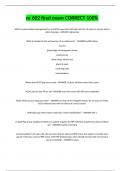nr 602 final exam CORRECT 100%
ASCCP recommended management for an ASCUS pap result with high risk hpv 16 cotest in 26 year old no
abnormal paps - ANSWER colposcopy
What is included in the well women of an adolescent? - ANSWER health history
menses
gynecologic and pregnancy issues
psychosocial
abuse drugs alcohol use
physical exam
screening tests
immunizations
When does ACOG pap smear start - ANSWER 21 years old done every three years
ACOG pap for over 30 yrs old - ANSWER every five years with HPV test completed
ACOG when can you stop pap smear - ANSWER can stop at 65 if negative history for 10 years or if they
had a hysterectomy with no history of cervical cancer
Bethesda pap smear report reads LSIL is what classification? - ANSWER CIN 1
A single Pap smear reading of ASCUS in a patient negative for HPV infection should have what as follow-
up? - ANSWER routine screening
a female patient is 35 years old. she has never had an abnormal PAP smear has regular screening since
age 18. If she has a normal PAP smear with HPV testing today, when should she have the next cervical
cancer screening? - ANSWER 5 years
, A young sexually active is having her first pap smear what would you explain? - ANSWER pap smear
detects cervical cancer
26 year old pap smear shows negative and positive HPV what do you do? - ANSWER repeat HPV and pap
what is not part of criteria for older women to cease pap smears? - ANSWER over 55 year old
no menarche in a 15 year old with no medical problems and Tanner stage 1 with a uterus - ANSWER
primary amenorrhea
No menses for at least 6 months - ANSWER secondary amenorrhea
female athlete triad - ANSWER disordered eating, amenorrhea, osteoporosis
labs for female athlete triad - ANSWER HCG
serum prolactin
serum TSH,FSH, LH
if amenorhea lasts longer than 6 months do what? - ANSWER bone density test
treatment plan for female athlete triad - ANSWER increase caloric intake, decrease exercise
prescribe ca and vit d 1200/1500 daily and vitamin e 400 iu daily
complications of female athlete triad - ANSWER osteopenia/osteoporosis (stress fracture)
myocardial atrophy, arrhythmia, hypotension, brady
hypoglycemia, dehydration, electrolytes
lanugo, telogen effluvium hair loss zerosis dry skin, infertility, low body mass, cachexia, respiratory failure
purpose of progesterone challenge - ANSWER endogenous estrogen
, primary and secondary amenorrhea originates in hypothalamus - ANSWER sheehans syndrome
symptoms of breast cancer ( early) - ANSWER None
Non-painful mass (occasionally pain)
Eczematous nipple (Paget's)
Serosanguinous (bloody) nipple discharge
late symptoms of breast cancer - ANSWER skin or nipple retraction
axilary lymhadenpathy
breast enlargement
redness, edema, brawny induration
peau d' orange
pain
fixation of the mass to the skin or chest wall
very late findings of breast cancer - ANSWER ulceration
supraclavicular lymphadenopathy
edema of the arm, bone, lung, liver, brain or other distant metstases
Follow up for breast cancer patients - ANSWER 1. Bilateral mammogram 6 months after complete
radiation post-lumpectomy; Mammogram yearly after
2. Contralateral mammogram annually post-mastectomy (entire breast + pectoralis major fascia)
PE every 3-6 months for 3 years then annually
fibrocystic breast disease - ANSWER the presence of single or multiple benign cysts in the breasts
, signs and symptoms of fibrocystic breast disease - ANSWER occurs 2 weeks before the onset of mensus
and worst right before the menstrual cycle. resolves after menses starts often in women in their 30's.
breast lumps are rubbery and mobile to touch
Tx for fibrocystic breast disease - ANSWER Once a benign diagnosis or normal findings have been
established by biopsy or on clinical or imaging findings, simple reassurance will provide many patients
with adequate relief.
For those patients who still seek treatment, symptomatic relief by avoiding trauma and by wearing a bra
with adequate support can be very helpful. The role of caffeine consumption in the development and
treatment of fibrocystic change has never been proven; however, many patients report relief of
symptoms after abstinence from coffee, tea, and chocolate. Similarly, observational studies have
suggested that low-fat diets can provide some relief. The data regarding the utility of vitamin E
supplementation and evening primrose oil are controversial. Mild analgesics such as acetaminophen and
nonsteroidal anti-inflammatory drugs (NSAIDs) can be used to relieve breast pain. For more symptomatic
women, danazol and tamoxifen have been found to be effective, although their significant side effects
have limited their acceptability and utility.
Fibroadenoma - ANSWER benign breast lesion 15-40 yrs old
risk factors for fibroadenoma - ANSWER multiple fibroadenomas associated with rate cancer syndromes
like mafficci syndrome, Cowden syndrome, carney complex early ETOH consumption
findings with fibroadenoma - ANSWER painless, firm or rubbery mass with well defined borders, freely
mobile, changes with size may occur with pregnany or menstrual cycle, lesions under 5 cm, considered
to be giant fibrodenomas no nipple discharge
Dx of fibroadenoma - ANSWER mammo, us to differentiate fluid filled to solid mass, fine needle
aspiration biopsy, open biopsy
Intraductal papilloma - ANSWER benign tumor within the ductal system of the breast, one of the
heterogeneous group of lesions encompassed by the term benign breast disease seen in females 30-50
risk factors for intraductal papilloma - ANSWER multiple papilloma's which increases the risk for breast
cancer




